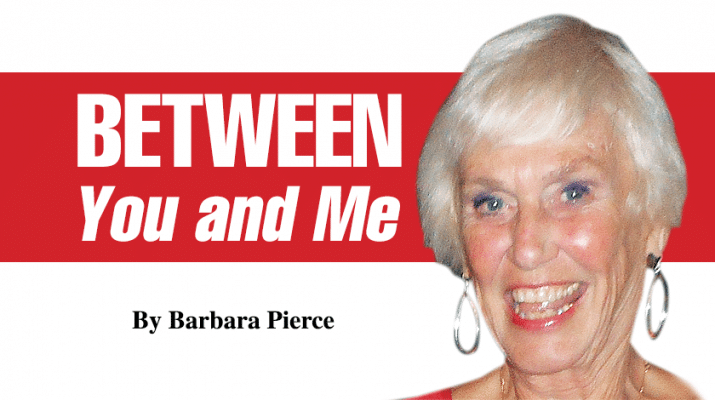We are all potential victims of unwanted advances
By Barbara Pierce
 Turn on the news these days and you‘re sure to hear more allegations of sexual abuse by powerful men: Harvey Weinstein, Bill O’Reilly, Kevin Spacey, chef John Besh, and journalist Mark Halperin. And that’s just a few — it’s a depressingly long list.
Turn on the news these days and you‘re sure to hear more allegations of sexual abuse by powerful men: Harvey Weinstein, Bill O’Reilly, Kevin Spacey, chef John Besh, and journalist Mark Halperin. And that’s just a few — it’s a depressingly long list.
“We’re in the midst of a watershed moment as the drip-drop of non-stop allegations turns into a tsunami,” said journalist Megyn Kelly on NBC’s “Megyn Kelly Today.” Kelly left Fox News in January after the drama of sexual harassment charges against ousted chief Roger Ailes.
But it’s not just celebrities who are victims and perpetrators. It’s all of us, us ordinary women and men. “The big story here isn’t about Hollywood celebrities at all — it’s that for thousands of women, across income levels and industries, sexual harassment on the job is a pervasive and daunting threat,” said 9to5.org online.
Sexual harassment is a major problem for women all across the world. It affects both men and women, though women bring the most allegations.
The effects range from uncomfortable to devastating and profound. They can jeopardize one’s emotional and physical health. They can endanger personal relationships. They can cause significant stress and anxiety that may lead to health issues, like loss of appetite, headaches, weight changes, and sleep disturbances. Sleep disturbances can lead to other serious health problems.
In addition to health problems, sexual harassment frequently leads to financial challenges — lost wages and unpaid leave. The career of some victims may be adversely impacted, as they cannot get references if they leave their current position to avoid a hostile work environment.
By law, every employee in New York is entitled to a working environment free from sexual harassment. Sexual harassment is defined as bullying or coercion of a sexual nature, or the unwelcome or inappropriate promise of rewards in exchange for sexual favors.
New York state statutes state that sexual harassment in the form of a “hostile environment” consists of words, signs, jokes, intimidation or physical violence of a sexual nature, of which are directed at an individual because of that individual’s sex.
Also, harassment takes the form of any unwanted verbal or physical advances, sexually explicit statements, or sexually discriminatory remarks that are offensive, which cause discomfort or humiliation, or interfere with the recipient’s job performance.
Employer may be liable
The burden of preventing sexual harassment rests on the employer. Employers are responsible for providing a work environment that is free of harassment. Employers are required by law to prevent and deal with harassment. If the employer has not taken steps to prevent and deal with harassment, the employer may be liable for any harassment.
What should you do if you experience sexual harassment?
Don’t take it. If you think an individual or group is sexually harassing you, don’t accept it as a joke. Don’t encourage the harasser by smiling, laughing at his or her jokes, or flirting back. Let him or her know that you do not want this attention.
Experts recommend:
— If possible, tell the harasser that the behavior affects you negatively. If possible, tell the harasser what behaviors you find offensive.
“‘No’ is an option to you,” advises Kelly. “You can say ‘no’ and walk out. You are in the right.”
— Write it down: Write down the incident in as much detail as possible. Leave out your feelings or judgment. Just write the facts, dates, times, and witnesses. Keep this outside of your workplace.
— Consider writing a letter to the harasser; keep a copy.
— Check your company policies. Most employee manuals have procedures for reporting harassment. Follow them closely. If you feel that reporting the incident to the person indicated is going to be a problem — for example, you’re supposed to report to your supervisor when he is the one harassing you — find a senior ally in the company who can help you get your message to the right people.
“Even if HR is a real option, it doesn’t always go your way,” said Kelly. “If you take a shot at the king, you better kill him. You’ve heard that saying. If you don’t win this showdown, you know what’s going to happen to you.”
— Contact the Civil Rights Bureau, NY State Attorney General’s Office, at (800) 771-7755 or civil.rights@ag.ny.gov.
— Contact the Equal Employment Opportunity Commission of the federal government. You have 45 days from the event to seek help and advice from the EEOC.
— Consider seeking counsel, even if you don’t plan on filing a lawsuit. This might help you understand how the law is on your side and help coach you to find a resolution.
“It takes guts,” said Kelly about those who are now coming forward. “It takes a lot of guts.”
Retaliation for making a complaint about sexual harassment is prohibited by law. If it does occurs, you may have a separate claim of retaliation in addition to any claim of sexual harassment.

